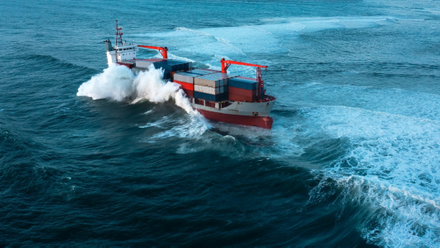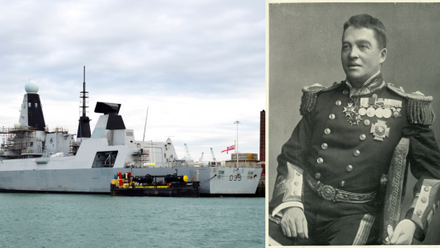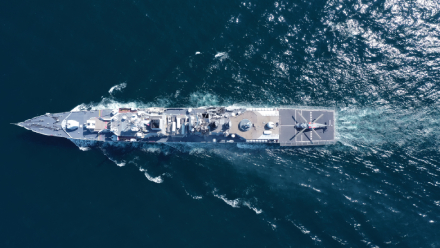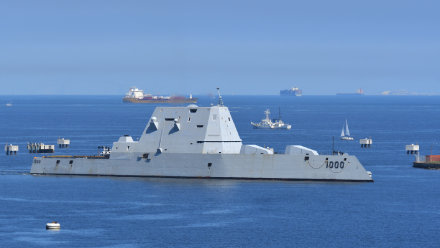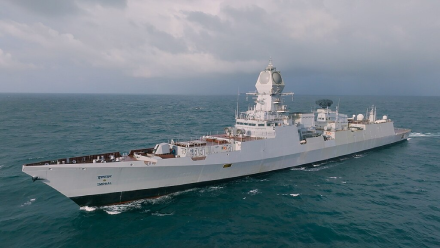Sarah Kenny OBE embracing digitalisation of the Navy
We spoke to the Chief Executive of BMT, Sarah Kenny OBE, about how the Engine as a Weapon conference signifies a new age in the relationship between the Navy and industry.
Later this month, IMarEST’s Engine as a Weapon (EAAW) conference (Bristol, November 28-29) will bring together the defence and naval sector with the marine and maritime industry to ‘explore the opportunities and challenges of manufacturing, integrating and supporting complex systems and equipment at the forefront of naval technology’.
For BMT’s Chief Executive Sarah Kenny OBE, who is already well practised in bringing the two sectors together, the themes due to be discussed at EAAW have never been more relevant.
“I think what we see increasingly is that defence generally and, for us, the Royal Navy specifically, is more willing and open to share and think through their problems with those that they trust in industry.
“Rather than saying, there’s a package solution, take it and use it, the relationship between defence and industry has evolved and is continuing to evolve towards a more collaborative space and I think that is very encouraging,” Sarah explained.
“Partly, I think it is driven by operational tempo and the need to respond to a particular threat and get to a solution quite quickly. But I think it’s also encouraging for us in industry to feel that we’re part of the bigger conversation about what’s going to define naval strategy and naval doctrine, not this year or next year but into the future.
“How can we use our technology knowledge, our industry knowledge, our knowledge of the world as we see it from an industrialist’s perspective to actually help the Navy think through what it needs going forwards? I would describe it as a more strategic relationship than it has ever been.”
Trusted friends
For Sarah and BMT, whose interests and expertise lie in everything from vessel design to marine surveys, collaborating with naval customers is far from a new experience. In fact, as part of Team Resolute, BMT’s most important current collaboration with the UK’s Navy is in designing the next generation of the Royal Fleet Auxiliary’s support ships.
“We are the design partner for the three new Fleet Solid Support ships, and we are so proud to have been selected,” Sarah said.
“Team Resolute comprises Navantia in the UK and Spain, and Harland & Wolff, who are conducting a significant upgrade to their yard and capabilities in Belfast and Appledore. This has really rekindled the workforces in both yards, and, at the same time, we have more than 100 skilled naval architect and marine and mechanical engineering roles that have been supported and developed off the back of the project.
“We are going to deliver three very capable and sustainable ships to support our aircraft carriers; these are parts of the backbone that keeps our Navy afloat at sea and in task forces. To me it’s a great example of true collaboration through industry and the UK supply chain. It’s also about societal value – these will be the greenest warships the Navy has ever had – so it is a privilege to be able to lead the design.”
Avoiding echo chambers
Sarah will be a joint keynote speaker at EAAW, alongside Rear Admiral Paul Carroll (Paul talks about the richness of diversity here). Key to the effectiveness of any naval and industry relationship, and key to how the two sectors work even in isolation, is having the right breadth of expertise in place and encouraging and embracing diversity of thought.
“I suppose, inevitably, there is a difference in the way that people in the naval and industrial sectors think. I wouldn’t say there is overwhelming good or bad to that but different, yes,” Sarah said.
“One of the things that concerns me is that we have this tendency to try to segment what we do. At BMT, while we are not a defence company, we are a company that works in defence, so why try to package things, and segment them? What I see in my job at BMT is that my clients’ problems are not segmented.
“If you go to talk to anybody in defence, they will tell you about the problems that they have with their ESG challenges; their recruiting challenges; how we can upskill and reskill people in increasingly digital environment; what we can do about clean maritime. None of those problems are specific to defence.
“What’s really on my mind is the avoidance of echo chambers. If you want to think your problems through, you need to value diversity of contribution, not just diversity of thought. So, if defence wants diversity of contribution, defence needs to go and get it, not just talk to the same old people about the same old thing and expect a different answer.”
While Sarah is looking forward to helping to share that message alongside Paul, as someone whose career has been inextricably linked with maritime and naval technology and innovation, she is also excited to be an EAAW attendee more generally, too.
“When I was asked to be involved, I had a look at the agenda and had a chat with my BMT technical team and I was excited to see that a conference that you could quite easily think was quite niche, has really been expanded and is talking about some of the issues that we all know about,” Sarah said.
“Yes, it is a technical conference, and we mustn’t forget that. But it is also talking about all the issues that are starting to disrupt, but which also have the potential to define what we do for the next five, 10 or 20 years. Particularly the themes around digitalisation, better use of data, autonomous systems, and what skills we will need for those systems.
“So, some of the themes I see coming out of the conference are exciting. They’re not just chiming with what we know is a problem today, but they point us towards where our success will be defined in terms of how well we deal with these issues and the impact we will make as a result.”
IMarEST’s Engine as a Weapon conference will take place on November 28-29 at SS Great Britain, Bristol. More details and ticket booking.
Top image: Chief Executive of BMT, Sarah Kenny OBE; Image Credit: BMT

